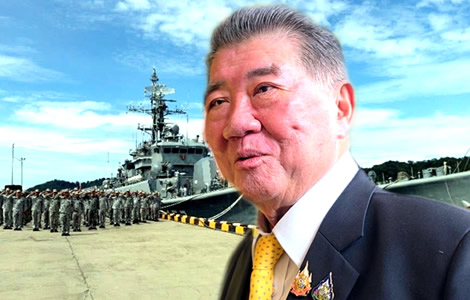Acting PM and Royal Thai Navy firmly deny plans to allow a US naval base in Phang-nga after protest leader Sondhi claims a secret deal tied to US trade talks. Officials say US access is temporary under existing agreements, with no approval for a permanent base.
Thailand’s acting Prime Minister and Interior Minister on Monday shot down reports that the government is considering hosting a US naval base in Phang-nga to counter China’s growing presence in the region. The denial followed explosive claims by Yellow Shirt firebrand and media insider Sondhi Limthongkul, who said on Sunday that the deal was tied to high-stakes trade talks between Thai officials and US negotiators in Washington. Hours later, the Royal Thai Navy weighed in—confirming the US, like other allied navies, has access to Tap Lamu Naval Base. But it slammed the idea of a permanent US military foothold in Thailand, calling it a non-starter.

The Thai government has rejected reports that it plans to allow the United States to establish a naval base in Phang-nga province. Acting Prime Minister and Interior Minister Phumtham Wechayachai said Monday that he had no knowledge of any such agreement.
The statement followed explosive claims made on Sunday by Yellow Shirt leader and media tycoon Sondhi Limthongkul. He alleged that the Tap Lamu Naval Base in Phang-nga had been offered to the US Navy. According to him, the concession was part of secret talks between Thai and US officials connected to a trade deal.
Phumtham rejects base rumours and says no military clarification has been provided to the government
However, Phumtham quickly dismissed the suggestion. He said the military had not provided any detailed information on the matter. “I still do not know the details of the US request,” he told reporters at Government House at 11:35 a.m. “The military has not clarified the situation. There is nothing to it so far.”
When asked whether the issue was linked to tax negotiations with the United States, Phumtham said it was being handled case by case. He did not rule out ongoing talks but made clear that no commitments had been made.
Meanwhile, the Royal Thai Navy issued a separate statement later in the day. It firmly denied that any foreign government had been offered a base in Thailand. The Navy clarified that Tap Lamu is being developed under an internal naval plan but is currently facing funding issues.
Thai Navy says Tap Lamu is under local development plan but faces budget issues and no foreign role
“There has been no confirmation or instruction from the government to involve the United States,” the statement said. “There is also no foreign budget support at this time.”
A senior Navy source also responded to the reports. “There has never been a proposal to allow the US to use Tap Lamu as a base,” the source said. “In fact, for Thailand, establishing a military base for any country is impossible.”
However, the source acknowledged that Thailand and the United States maintain a logistics support agreement. This agreement allows American ships to dock, refuel, and resupply at several Thai military facilities. These include Tap Lamu, Sattahip, Songkhla and U-Tapao Airport.
“Under the agreement, the US Navy can use any of these locations temporarily,” the source said. “But they are not permanent US bases.”
US Navy access is based on an existing logistics pact but does not include permanent basing arrangements
Additionally, the same access is granted to other friendly navies. “It’s not limited to the United States,” the source added. “Navies from other allied countries also make use of our facilities.”
Although Tap Lamu holds strategic value due to its access to the Indian Ocean, Thai officials remain cautious. For decades, Thailand has tried to balance its relationships with both the United States and China. Allowing the US to build or control a base would be seen as a major geopolitical shift.
Even though the US has long expressed interest in increasing its military presence in Southeast Asia, Thai authorities have consistently resisted such proposals. According to military insiders, every Thai government in recent history has turned down suggestions of a US base.
“Even though the US has always wanted a base in Thailand, we’ve never agreed,” the Navy source said. “We already have a logistics framework. That’s enough.”
Thai officials continue to reject US basing ideas as part of a long-standing balancing strategy with China
This framework, they added, is similar to what exists at U-Tapao Airport. Though frequently used by the US military, U-Tapao is not an official American base. It remains under Thai control and is used by various nations under agreed terms.
Sondhi’s claim that Tap Lamu is part of a secret deal to counter China’s growing influence was not supported by any official sources. Still, it sparked public concern and online debate.
Given the rising tension in the Indo-Pacific region, any signs of deeper US military involvement in Thailand would likely draw attention from Beijing. But officials insist there are no plans for such a move.
Arch conservative icon Sondhi pushes anti-American sentiment against both Thaksin and the People’s Party
Royal Thai Navy takes part in 12-day exercise with US and Canadian navies in the Upper Gulf of Thailand
For now, both the government and the military appear eager to shut down the controversy. By Monday evening, officials had restated their commitment to maintaining Thai sovereignty and neutrality.
Nonetheless, Thailand is still a US military ally, although successive Thai governments since 2006 have watered down the alliance created by the 1954 Manila Pact and 1962 Thanat-Rusk Joint Communiqué. In addition, it was designated a key non-North Atlantic Treaty Alliance (NATO) treaty partner by the United States in 2003.
Certainly, while US forces continue to visit Thai naval facilities, there is no plan to offer them a permanent base. The government has not approved any such proposal. The Royal Thai Navy continues to operate under existing agreements, with no change in policy.
Join the Thai News forum, follow Thai Examiner on Facebook here
Receive all our stories as they come out on Telegram here
Follow Thai Examiner here
Further reading:
US Navy in Sihanoukville on the Gulf of Thailand as Cambodia pivots towards warmer ties with America
Move Forward opposes any plan to allow a US base in Thailand and commits to uphold its sovereignty
Ironclad partnership heralded as Marcos visits Washington amid raised South China Sea tensions
Chinese Foreign Minister tells world elite in Shanghai of a ‘new form of human advancement’ in China
Sub call due soon but closer ties between Chinese and Thai navies signalled by top-level visit
China’s new foreign minister warns of certain US-Chinese war if Washington fails to reverse course
War with China is a rising spectre that must be confronted as US General predicts conflict by 2025
Heat turned up over the Sukhothai naval tragedy with 19 thought to have perished and 10 missing
Bad news from Beijing with Xi’s rise, the prospect of war and a divided world have greatly grown
Abe’s legacy will be his efforts to awaken Japan and build a defensive alliance against China
Former Pheu Thai finance minister expresses unease about US regional moves to counter China’s rise
Thailand and Japan announce defence pact on visit by Japanese PM to Bangkok ahead of US summit


















